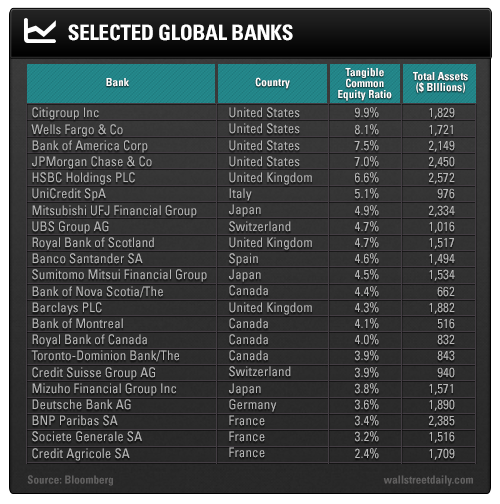Last week, Deutsche Bank AG (DE:DBKGn) announced that it expects an enormous third-quarter loss of EUR6.2 billion ($7 billion). Deutsche may also have to cancel its dividend, which has been paid since the German bank was formed from three regional banks in 1957.
Meanwhile, Credit Suisse (VX:CSGN) – another large European bank – indicated that it’s planning a huge capital raise. In other words, the equity holders will be diluted.
These moves raise questions about the health of the European banking system and what may be going on behind the scenes.
And with the financial crisis still fresh in our memories, it’s only natural to wonder whether our own banking system here in the United States can be trusted.
To get to the bottom of things, I’ve ranked some of the largest global banks based on their tangible common equity (TCE) ratios in the following table.

The TCE ratio can be used to gauge leverage and estimate the magnitude of losses a bank can withstand during a meltdown scenario before shareholder equity is wiped out.
Here are the top takeaways from this table:
- U.S. Banks Are in Great Shape
Thankfully, we can rest easy about the U.S. banks.
During the financial crisis of 2008-09, the biggest U.S. banks were recapitalized. They’ve worked to reduce leverage and fortify their balance sheets ever since.
This is evident with Citigroup Inc (N:C), Wells Fargo (N:WFC), Bank of America Corp (N:BAC), and JPMorgan Chase & Co (N:JPM) at the very top of the global TCE ratio ranking.
- European Banks Are Undercapitalized
Unlike the United States, Europe failed to recapitalize its banks during the financial crisis.
Given that Deutsche and Credit Suisse both have TCE ratios below 4%, their recent announcements aren’t all that surprising. It’s actually a good thing that some of the weaker banks are preemptively taking measures to shore up their balance sheets before a banking crisis is at the doorstep.
As you can see, the French banks – BNP Paribas (PA:BNPP), Societe Generale (PA:SOGN), and Credit Agricole (PA:CAGR) – are woefully unprepared for an adverse scenario. Mon dieu!
- Canadian Banks Look Marginal
The Canadian banks aren’t in horrible shape, but they’re still in a precarious position given the weakness in the Canadian economy.
Canadians will contend that their banking system is the safest in the world. We shall see.
- The Next Crisis
The epicenter of the next crisis isn’t going to be the U.S. banking system. This is not just due to large capital buffers, either.
For example, as a result of the Volcker Rule, the universal banks (those with both commercial and investment banking arms) aren’t able to take on as much risk.
Thus, we don’t have to worry about the safety of our savings accounts or lose sleep about an inability to withdraw money from ATMs.
- Bank Stocks Not a “Buy”
The U.S. banking system may be safe, but that doesn’t necessarily mean that U.S. bank stocks are great investments.
Right now, I much prefer a group of shadow banks – namely the mortgage REITs.
